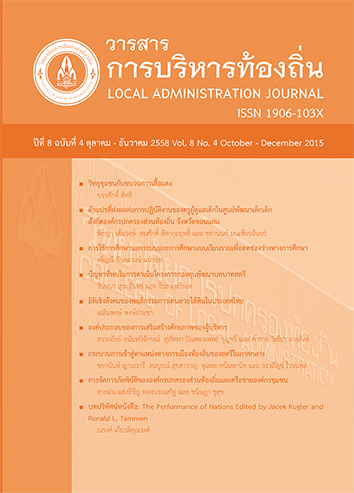มิติเชิงสังคมของพฤติกรรมการเล่นหวยใต้ดินในประเทศไทย (Social Dimensions of Underground Lottery Wagering in Thailand)
Keywords:
หวยใต้ดิน, ความเหลื่อมล้ำทางสังคม, Underground lottery, Social inequalityAbstract
การศึกษาวิจัยนี้ได้ชี้ให้เห็นถึงความสัมพันธ์ระหว่างตัวแปรลักษณะทางประชากร เศรษฐกิจ และสังคม กับการซื้อหวยใต้ดินของประชาชน โดยใช้ข้อมูลจากการสัมภาษณ์กลุ่มตัวอย่างที่มีอายุ ตั้งแต่ 18 ปีขึ้นไป จำนวน 7,900 กลุ่มตัวอย่างทั่วทุกภูมิภาคในประเทศไทย จากการวิเคราะห์ข้อมูลด้วยสมการถดถอยโลจิสติก (Logistic Regression) พบว่า หวยใต้ดินได้สร้างความเหลื่อมล้ำในสังคมมากกว่าที่สังคมจะตระหนัก กล่าวคือ ประชาชนในภาคอีสานซึ่งเป็นภาคที่มีรายได้ต่อหัวต่ำที่สุดในประเทศ ได้ใช้จ่ายเงินเพื่อการเล่นหวยใต้ดินเป็นสัดส่วนของเงินรายได้ที่สูงกว่าประชาชนในภาคอื่น ๆ เพศหญิงซึ่งเป็นเพศที่มีรายได้โดยเฉลี่ยต่ำกว่าเพศชายซื้อหวยใต้ดินในสัดส่วนของเงินรายได้สูงกว่าเพศชาย ผู้ที่ยังคงอยู่กับคู่สมรสซึ่งต้องรับผิดชอบเลี้ยงดูครอบครัวใช้เงินรายได้เพื่อซื้อหวยใต้ดินสูงกว่าคนโสดหรืออยู่ตามลำพัง ผู้ที่มีการศึกษาต่ำกว่าชั้นมัธยมจะใช้เงินเพื่อซื้อหวยใต้ดินเป็นสัดส่วนของเงินรายได้ที่สูงกว่าผู้ที่มีการศึกษาสูงกว่าชั้นมัธยม ผู้ที่มีรายได้น้อยได้ใช้เงินเพื่อซื้อหวยใต้ดินเป็นสัดส่วนของรายได้ที่สูงกว่าผู้ที่มีรายได้สูง และข้าราชการซึ่งเป็นผู้ที่มีรายได้น้อยกว่าอาชีพอื่นได้ใช้เงินไปเพื่อซื้อหวยใต้ดินมากกว่าอาชีพอื่น
Social Dimensions of Underground Lottery Wagering in Thailand
Relying on a nationally selected sample of 7,900 persons aged 18 and above, this study tests the effect of demographic, economic and social variables on the propensity to wager on the underground lottery. Using the method of logistic regression, the study indicates that the underground lottery has brought more social inequality than we previously realized. In this study, we found that people in the northeast region (Isaan), who have endured the lowest per capita income for so long, spent the highest proportion of their income on the underground lottery. Females, who on average earn a lower income than their male counterparts, also spent a greater proportion of their income on this form of lottery. Those who are married, living with a spouse, and are the primary bread winners also spend proportionately more, as do people who finished less than a secondary education and those, in general, with a low income.
Downloads
Published
How to Cite
Issue
Section
License
The copyright of all articles published in the Local Administration Journalis owned by the College of Local Administration, Khon Kaen University.



